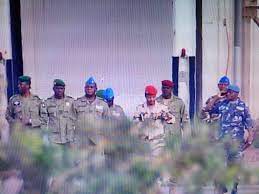APA – Abuja ((Nigeria) – In a letter dated August 4, the United Episcopal Conferences of West Africa spoke out against the possibility of military intervention to restore President Mohamed Bazoum to office.
Last Sunday, the one-week ultimatum given by the Economic Community of West African States (ECOWAS) for a return to constitutional order expired. In the end, the coup plotters failed to comply with the regional organisation’s injunction.
On Thursday 10 August, a new Extraordinary Summit of ECOWAS Heads of State and Government was convened in Abuja, Nigeria, to analyse recent developments. With this in mind, the Bishops’ Conferences of West Africa have published a letter urging restraint and discernment.
“We, the Cardinals, Archbishops and Bishops of the United Episcopal Conferences of West Africa, after consultation, are deeply concerned by the sub-regional tension linked to the political situation in
Niger,” they state right at the outset.
Faced with the events currently unfolding in our sub-region,” they went on to say that “it is our moral, spiritual and pastoral duty to address this letter of exhortation to all those involved, from near or far, in the management of this crisis, in order to invite everyone to demonstrate responsibility. The lives of the peoples of West Africa
are at stake.
Keeping the integrity of the people as their central vision, and emphasising respect for human dignity and a high sense of accountability to mankind, history and God, the religious affirm that “nothing can justify the creation or facilitation of an environment that is destructive to our people. No individual, national, regional, geopolitical or denominational interest or project should take precedence over the preservation of life, human dignity and the future of generations to come in West Africa and beyond.”
For the Cardinals, Archbishops and Bishops of the Bishops’ Conferences of West Africa, “violence does not solve any problem, not even the one that triggered it.” They therefore made a point of informing ECOWAS and the African Union (AU) that “any military intervention at this time would complicate the situation of the people of Niger and the sub-region more than it would provide solutions.”
In a Sahel ravaged by jihadism, with “its macabre toll of widows, orphans, displaced persons, starving people and the mutilated, the people are not waiting for regional and African institutions to add to this toll,” the religious leaders insisted.
“The case of Libya remains a tragic example of the disastrous consequences on the lives, dignity and future of populations. We cannot remain silent in the face of such situations and must learn the lessons to ensure that such events do not happen again, particularly with Niger as a potential epicentre of a similar crisis,” they concluded.
ID/ac/fss/abj/APA


